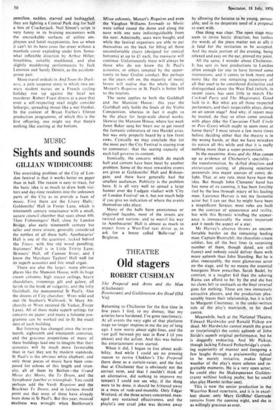MUSIC
Sights and sounds
GILLIAN WIDDICOMB1
The overriding problem of the City of Lon- don festival is that it works better on paper than in hall. The reason is easy to trace, for the basic idea is as much to draw both visi- tors and day-time residents into the unknown parts of the City as to provide a feast of music. First there are the Livery Halls: Goldsmiths' Hall in Foster Lane. which is nineteenth century renaissance with a small, square council chamber that seats about 400. Then Fishmongers' Hall, close by London Bridge, also early nineteenth century but taller and more ornate, generally considered the noblest of all these halls. Apothecaries' Hall is one of the quaintest, tucked behind the Times, with fine old wood panelling; Stationers' Hall is in Little Trinity Lane; Skinners' Hall, off Cannon Street, and I know the Merchant Taylors' Hall well for its superb acoustics and fine small organ.
There -are also the larger. more obvious places like the Mansion House, with its huge cream columns. high stucco ceilings, heavy chandeliers, trimmings gilt and galore, all lavish to the brink of vulgarity; and the lofty Guildhall, the monumental St Paul's. Also the dozens of City churches: Wren wild and real (St Stephen's Walbrook, St Mary Ab- church) or Wren restored (St Vedast, Foster Lane). All of these make superb settings for concerts on paper; and many a fulsome pro- gramme can be worked out to fit the exact date of each building.
But listening has changed since the seven- teenth, eighteenth and nineteenth centuries, and the gracious proportions of many of these buildings lead one to imagine that their acoustics will be much more favourable than in fact they are by modern standards. St Paul's is the obvious white elephant, and only three pieces of music have been com- posed for echoes of this length and inten- sity, all of them by Berlioz—the Grand Messe des Morts, the Te Deum, and the Symphonic funCbre et triomphale. You could perhaps add the Verdi Requiem and the Bruckner Te Deum, and in fairness should point out that most of these have already been done in St Paul's. But this year, musical madness was wrought when Beethoven's Missa solemnis, Mozart's Requiem and even the Vaughan Williams Serenade to Music were rolled round the dome and along the nave with one note indistinguishable from the next. Admittedly, seats were bought, and while the festival organisers are able to pat themselves on the back for filling all those uncomfortable chairs (designed for conical bottoms) at up to £3 each, the massacre will continue. Unfortunately there will always be those who do not know the St Paul's acoustics, or others tempted by the oppor- tunity to hear Giulini conduct. But perhaps as the years roll on, the majority of music lovers will realise that the whole idea of Mozart's Requiem in St. Paul's is better left to the tourists.
The same applies to both the Guildhall and the Mansion- House: this year the Guildhall only holds the finals of the Violin Competition, whereas in fact it ought to be the place for large-scale choral works; likewise the Mansion House, where last week Janet Baker sang her heart out to get round the fantastic coloratura of two Handel arias, but was only properly heard by a few front rows. Cynically we may conclude that for the most part the City Festival is staying true to commerce: that the seating capacity of each hall governs its content.
Ironically, the concerts which do match hall and content have been beset by another problem. Some of the most rewarding events are given at Goldsmiths' Hall and Bishops- gate, and these have generally had the smallest audiences. Publicity is the problem here. It is all very well to spread a large banner over the Ludgate viaduct with `City of London Festival' on it, but not much help if you give no indication of where the events themselves take place.
Many of the halls have anonymous or disguised facades, most of the streets are twisted and narrow; and to weevil his way to Apothecaries' Hall is almost as much to expect from a West-End taxi driver as to ask for a house called 'Belle-vue' in Brighton.






















































 Previous page
Previous page